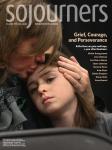I RECENTLY saw a photograph of me taken on the day I was born: two weeks premature, swaddled, peaceful, vulnerable, beautiful—pure potential. I wanted to travel back in time to give the little guy some advice and protect him. Most of all I wanted him to experience the things I missed—those that only seem to come to our attention with the benefit of hindsight. I wanted him to take more risks for the good, not worry so much, be more open to receiving love, take more walks in fields and on beaches, and avoid a thousand mistakes. I wanted him to be different.
While wanting to undo history is probably a human universal, it can also be a kind of psychic violence, emerging from the notion that there is such a thing as the person we were “supposed” to be. Indulging this notion led to me projecting it onto three intriguing films. Short Term 12 is a lovely, painful story of recovery from childhood wounds. In Seconds, the newly restored melancholic science fiction tale of human engineering from 1966, Rock Hudson brilliantly imagines what happens when you convince yourself that superficiality is depth and exchange the life you have for cosmetic “transformation.”
Both touch on questions of how to live with what you have, and find their answer in About Time, the latest comedy from Richard Curtis, writer-director of Four Weddings and a Funeral and Love, Actually. It’s easy to resist Curtis’ films—the privilege that his characters inhabit is rarely acknowledged, and their speech patterns are so monochromatic as to suggest they’re all auditioning for an Aaron Sorkin project. (I loved The West Wing as much as the next person, but nobody really talks like that.)
But About Time is funny, beguiling, and even profound. Its protagonist has the power to time-travel, and begins reliving each day once over in order to notice what he missed the first time around. He learns something good enough to be counted among the great spiritual teachings: The secret of happiness includes “reliving” every day—by learning to notice things the first time around. The path to that destination is the journey of a lifetime, but the technique is simple. It might best be summed up by another movie cliché that conceals the wisdom of the ages: Instead of trying to be someone else, devote energy, thought, love, and community discernment to figuring out what you want and learning how to ask for it.

Got something to say about what you're reading? We value your feedback!